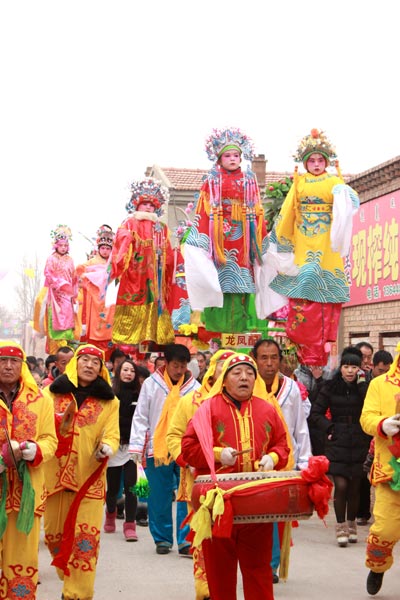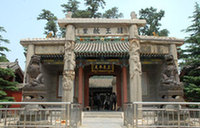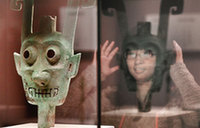Dance to the fading drumbeat
By Wang Kaihao ( China Daily ) Updated: 2014-02-27 09:14:42
 |
|
A naoge frame with two children is heavy, making it a great challenge for its carriers to stride and dance.[Photo by Wang Kaihao/China Daily] |
"But the problem is, today's kids have better nutrition than before and are heavier, but performers are not as strong as before because we have less farmwork than in the old days," he jokes. He explains that he asks for one day off during the show because he finds the children on his attic too heavy to carry, and has to look for substitute children among his big family.
"It requires a certain technique. A strong man may not face difficulties carrying the children for a few moments but will not be able to dance with them."
According to him, the naoge tradition is generally believed to have been brought by immigrants from neighboring Shanxi province to the Hohhot area 300 years ago. But the performance art was almost forgotten in the early 20th century. When a plague broke out in the village in 1910, villagers went back to this old tradition to ask heaven for help. And after the plague, the annual naoge show resumed around Lantern Festival.
"No matter whether it was superstitious or not then, naoge has become embedded into our most precious customs," says Hu. "This is the way we pray for our children's health and for higher achievements in the future."
Naoge was listed among national intangible cultural heritage items in 2008, and so far remains the only item from Tumd Left Banner on that list.
Lapu village has 1,100 residents, and 24 families have consistently performed naoge, according to village head Ren Hengmao. Each family traditionally only performs the same play year after year.
The repertoire of the original 24 plays include well-known ancient legends or romance stories like The Monkey King, and The Weaver Girl and the Cowherd. But it also absorbs historical stories from grasslands in Inner Mongolia. New immigrants to Lapu from nearby villages have their own versions of naoge.
|
|
|
|
|
|
|
|























 Raymond Zhou:
Raymond Zhou: Pauline D Loh:
Pauline D Loh: Hot Pot
Hot Pot Eco China
Eco China China Dream
China Dream China Face
China Face





